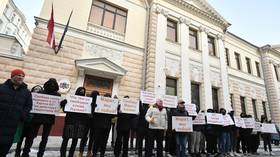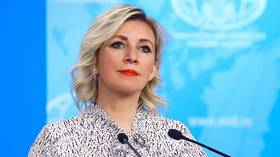EU country eases detention of Russian media editor – media

The Latvian authorities released journalist Marat Kasem into house arrest on Thursday, according to his employer, Sputnik Lithuania. Kasem had been in a Riga jail since January, facing charges of espionage and violating EU sanctions on Russian media.
Under the terms of his release, Kasem must not leave his home address in Salaspils from 11pm to 7am every day, and must check in at the local police station twice a week, Sputnik reported.
Though Kasem is a Latvian citizen, Riga had declared him persona non grata in 2019 and deported him to Russia, citing his involvement with Sputnik. Since then, he has lived in Moscow, becoming editor-in-chief of Sputnik Lithuania. Last December, he returned to Riga to visit his ailing grandmother, but was arrested before he could do so. The woman passed away in late January while Kasem was in detention.
The Latvian government charged him with espionage and violating EU sanctions on Russia, according to his lawyer, Stanislovas Tomas. If convicted, he faces up to 25 years in prison.
Tomas tried to appeal the jailing of Kasem, but the court in Riga rejected his motion on March 6, leaving the journalist behind bars. According to Sputnik, Kasem was placed in a solitary cell inside the wing used to house convicts, not suspects in pre-trial detention. Kasem’s health deteriorated as a result of the “unsanitary conditions” in the prison and a chronic condition which was not named.
The editor is accused of accepting a salary from Sputnik, which is part of the media group Rossiya Segodnya, funded by the Russian government. The agency is banned from broadcasting in the EU as part of the sanctions put in place last March over the Ukraine conflict. The Latvian authorities did not explain why Kasem was charged with espionage.
Moscow has condemned Kasem’s detention as unjust and an attack on the freedom of the press. The Russian human rights commissioner, Tatyana Moskalkova, has called on the UN high commissioner for human rights to personally address the issue.













